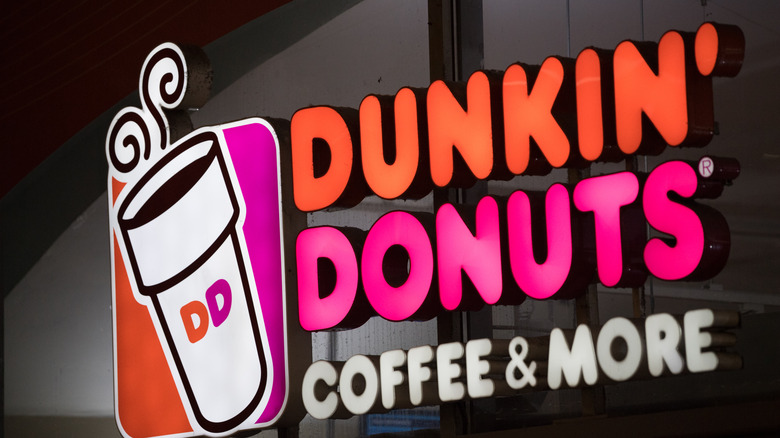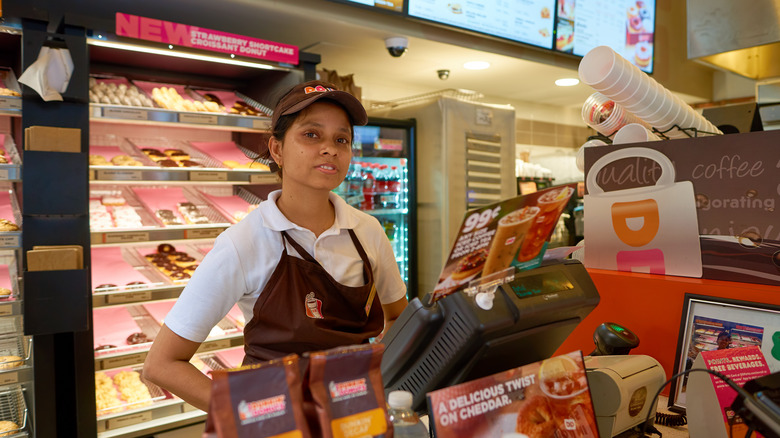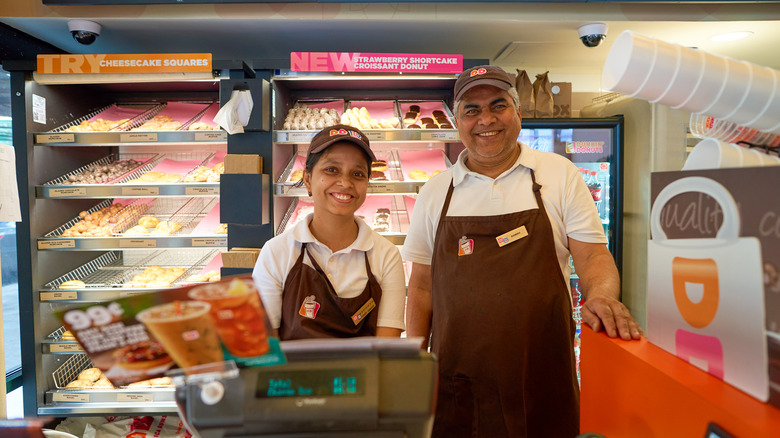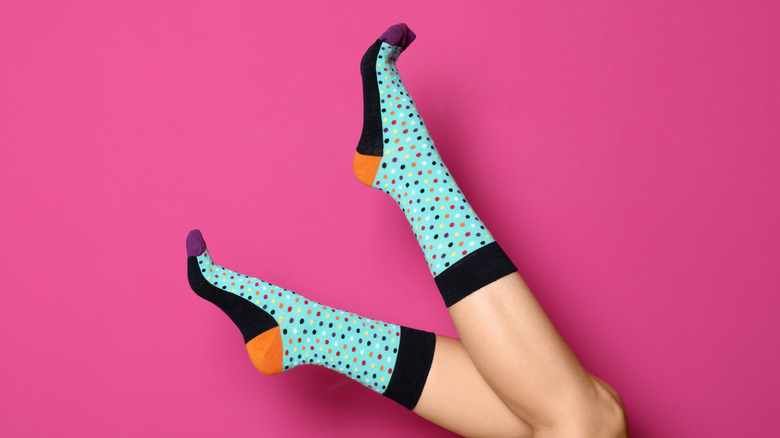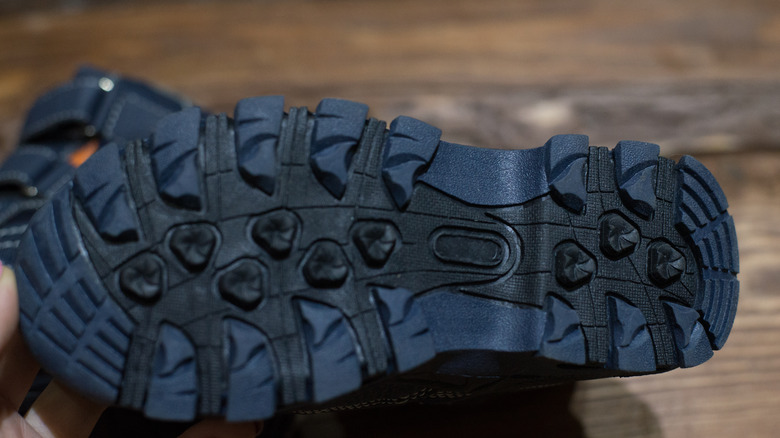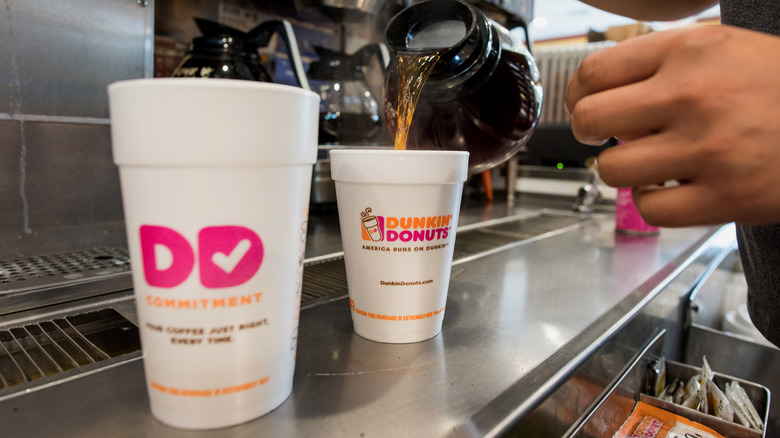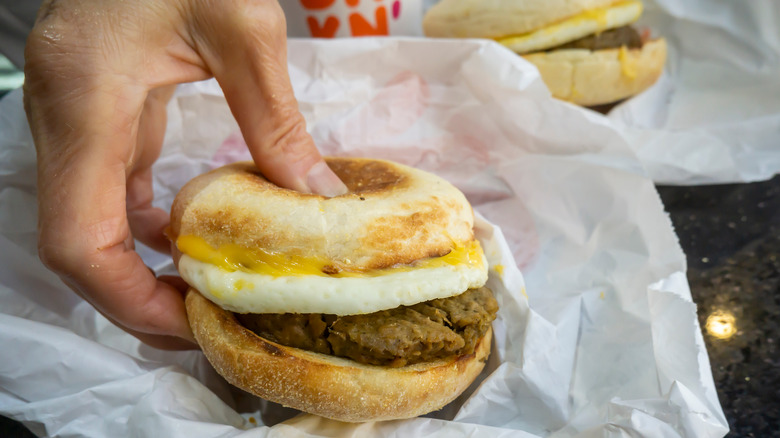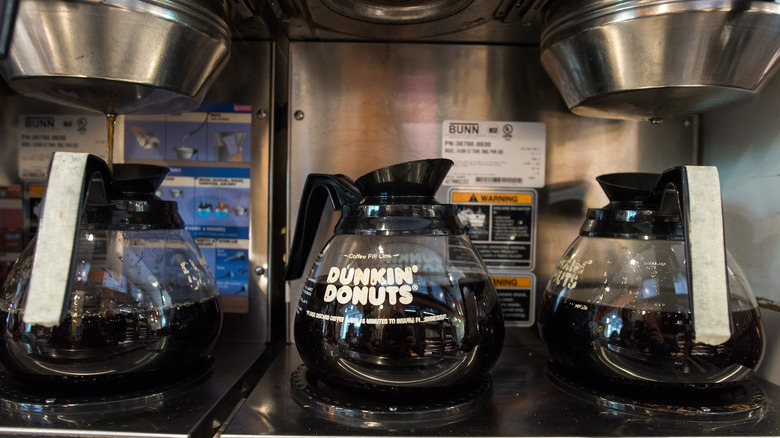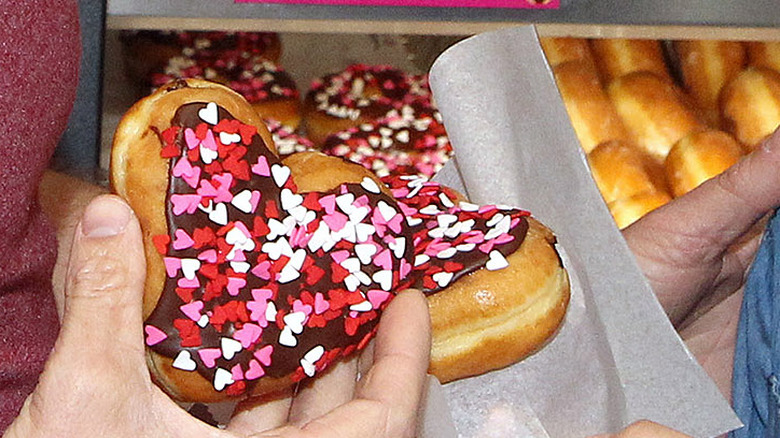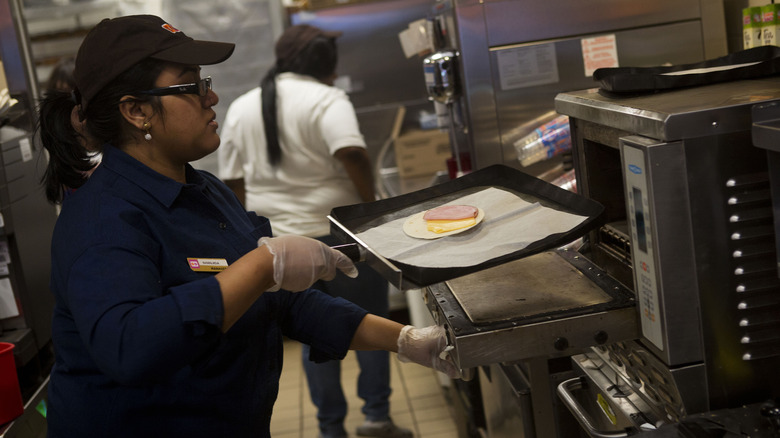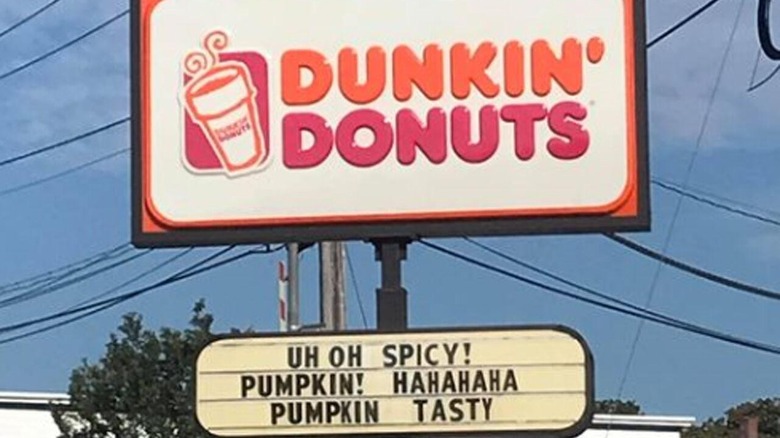Weird Rules That Dunkin' Donuts Workers Have To Follow
America might run on Dunkin', but what about those who keep Dunkin' running?
You know them by their signature visor and their staple brown apron: the people behind America's favorite coffee-and-donut house, who perfect your Coolatta and dole out donut combos on the daily. The Dunkin' workforce is powerful — and as of this summer, it's expanding. With 25,000 new jobs opened last year alone and many American's uprooted from former employment by the pandemic, Dunkin' Donuts is a more accessible career option than ever. It's estimated that, worldwide, around 270,000 people get paychecks from the brand — at one point, Madonna was one of them. But what exactly does working there entail?
In search of the authentic Dunkin' employee experience, we did a deep dive into the employee handbook, the depths of Reddit, and spoke to former employee Caroline Hoffman, who worked at Dunkin Donuts in Parma, Ohio the summer between high school and college. (It would be Hoffman's first and last experience in the food sector service.) Looking beyond the visor and apron, we uncovered exactly what these workers are signing up for, when they sign on with the national chain. Some of the rules? Pretty weird.
You can't have acrylic nails and only certain nail polish colors are permitted
Ever checked the fingernails on the person handing you your twenty cents of change at Dunkin'? We haven't either. But, if you were to look, you might notice they're always pretty bare. Dunkin' has an anti-fancy-nail policy outlined in its handbook — which, by the way, you can snag a copy of online if you're ever in need of some light reading.
Fingernails must be "kept maintained and clean, free of dirt or debris," the policy begins, before getting more strict. (Hey, we all appreciate clean hands more in this post-pandemic world than ever before.) The handbook goes on to outline: "Nail polish is limited to natural colors and may not be more than ½" long from the tip of the finger. Artificial nails, nail charms or decals are not permitted."
One Reddit user confirmed that acrylics, while fabulous everywhere else, are not so chic at Dunkin. "No acrylics, no polish. [The manager] fired a girl for not removing her acrylics and she gave her like 5 days to do it," the Reddit commenter confirmed. While there seem to be some inconsistencies between locations about how stringently this rule is implemented, the fact that it's in the handbook seems strange enough.
There are strict rules on jewelry, makeup, and tattoos
While Dunkin's anti-acrylics stance might make sense — a chip of polish in an egg sandwich is a frightening thought — the coffee chain also has inexplicably specific rules regarding jewelry, makeup, and tattoos. The handbook outlines that tattoos must be covered. Seems a bit uptight, since not only did Dunkin' make Skinfo's list of most tattoo-friendly employers, but they also celebrated National Tattoo Day last summer with a line of their own temporary ink.
So that line in the manual may need updating. But as employees on Indeed have verified, the official company policies on jewelry and makeup are more heavily adhered to: they are "limited to wearing no more than two (2) earrings per ear," and hoops are prohibited, which just begs the question, does Dunkin' know the saying about hoops?
"Necklaces must be worn under shirts," the book goes on to outline. "Watches and a single ring on each hand may be worn. Bracelets should be removed before starting a shift. Facial jewelry and tongue rings must be removed before the start of a shift."
If you think that verges on absurd, their makeup policies will put you over the edge. Dunkin' employees are apparently not allowed to wear "excessive makeup," which is then specified as "dark eyeliner and bright colored eyeshadow." We don't know about you, but we see no problem with a little bit of color-pop eyelid inspiration with daily Dunks!
You have to wear jeans or khakis (no black jeans!)
So, yes, just about any workplace has a dress code. And as we've established, Dunkin's is in many ways oddly specific. But here's where it gets a little weirder.
The Dunkin' look starts with a crisp white polo — which, as Hoffman and many other employees have attested to, gets very dirty. "My mom used to make me change clothes in the garage when I got home," Hoffman remembers. The coffee stains are not easily removed, but neither is the smell.
That white polo is layered under the brown apron, and topped with the visor and, these days, a mandatory mask (there are branded options, of course). This is all the fairly standard part. But as for what to wear on the bottom? Dunkin' demands either khakis or jeans, with an emphasis that seems consistent across chains on no black jeans. As one Indeed member put it: "Blue jeans ONLY."
What is going on here? Is it that the black would clash with the brown apron? If so, minus 10 for the weird rule, but plus 20 for the fashion sense.
Socks must be worn at all times
This rule made us laugh. Something about seeing "SOCKS: Must be worn at all times," in the employee handbook just feels hilarious and bizarre. The coffee and donut chain cites their "health and sanitation policies" as the reason for this decree, which we could see a case being made for. One quick Google search of "is wearing socks more sanitary than not?" turns up pages worth of articles about how socks absorb moisture, should probably be changed every day, and how not wearing them could indeed be bad for your health. Didn't know socks were such a hot topic in the health arena? You're not alone.
But Dunkin' might not actually be so well-versed on the sanitary sock subject either. When we asked Hoffman if she remembered that rule, she said it probably has more to do with the shoe requirements than anything else. "The shoes were so weird," she told us, "so that was probably right."
You're required to buy a pair of very weird shoes
The shoes Dunkin' workers are required to wear are the talk of the message boards. According to the handbook, they must be black, rubber-soled, and closed-toe. They also must be "polished or brushed clean."
"PLEASE wear non-slip shoes," one Reddit user warned a new Dunkin' hire. "Ice and water and lids and wax paper and bags will kill your a** without em." The Redditor didn't mention anything about the shoe polishing mandate, so godspeed to that new Dunkin hire.
Hoffman remembers that when she started, her manager handed her a flyer with a picture of the exact type of shoe she needed. "We had to purchase a very, very ugly and specific shoe for the job. This might be standard for other food service jobs, this was the only one I ever had, but I remember going to the mall with the photo in my hand looking for it," she says. "They were a special non-slip shoe, and they were black and chunky."
Hoffman's mom made her leave the shoes in the garage as well, because not only did they smell like donuts, but "they were an eyesore."
The training is pretty systematic
If you've ever worked for a large chain of any sort, you know that they don't leave much up to chance when it comes to training. After watching many vlogs about new hires' first weeks at Dunkin' (a surprising amount of these YouTube specialties exist), we gleaned a bit of insight into the quirky training regimen that Dunkin employs.
First of all, they teach a couple of different acronyms to their workers. Our personal favorite is "E.M.C.," also known as the "egg meat cheese equation," which outlines how to make a sandwich while also paying homage to Albert Einstein. The second is C.A.R.E., which is a 6-step process that means "Greet, take order, collect payment, assemble order, deliver, thank you and come again" — not sure exactly how the letters translate, but we found this one on a Quizlet someone made summarizing the employee training procedures.
While on-the-floor training seems to vary, we were surprised to learn that the general consensus seems to be to start newbies on iced and hot coffee first, and encourage them to focus solely on those basics for their first two shifts. Hoffman remembers that the iced coffee wasn't too complicated; "We made the iced coffee in this giant bucket with ice and water and stuff," she said.
Only more senior crew members can make the breakfast sandwiches
"One of the rules that I thought was kind of comical," Hoffman began, "was that only more 'senior' crew members could prep and put together the breakfast sandwiches." While this may not be the case at every Dunkin', Hoffman went on to explain that during her summer spent behind the register at Dunkin Donuts, she started to think this was "kind of backwards."
"Working the register and drive through can require a bit of mental math, a lot of speed, and quick thinking — especially if a customer is feeling moody that day. I was usually the one spinning out ten iced lattes and packing two dozen donuts, while the more senior members would toast some bagels or put cheese on croissants." Sounds like maybe this rule was less about capability and more about rewarding the senior members. Hoffman admits that she never made it to breakfast-sandwich level as a Dunkin' employee, but that the entire summer she worked there, she wanted to. "I was jealous!" she laughed.
If you don't use a carafe of coffee within 18 minutes, you must discard it
This is a pride point for Dunkin: at the top of their press kit, they proclaim that "Dunkin' Donuts coffee is freshly ground, freshly brewed and freshly served. If not used within 18 minutes, Dunkin' Donuts coffee is discarded and a new carafe is freshly brewed."
We get it, overcooked coffee is a less-than-appetizing way to get your caffeine fix, but you have to wonder about the science behind the 18-minute decision. As Hoffman remembers, this rule was pretty strictly adhered to at her branch in Parma, Ohio. Hoffman recalled that there was an actual timer on the coffee carafe, and whenever it would ring, an employee was charged with pouring it out and refreshing it.
"It's a little wasteful, but coffee does get stale," Hoffman said. "Especially when you're making it in such big batches."
Reddit users didn't have the same experience. Although Dunkin' practically guarantees the 18-minute standard, there's no way to ensure every location complies. "It might be a company standard but whether upper management enforces it or not is entirely up in the air. At my Dunkin, we would mark the pots, but our managers were too cheap to waste the coffee, so we just remarked them without pouring anything out," confessed one user.
If you fall in love with a coworker, one of you has to move to a different location
Ah, the office romance. A tale as old as time, and one made even sweeter when "the office" is packed with powdery donuts. It's no surprise that Dunkin' addresses workplace relationships in their handbook, any quality employer should probably consider the reality that eight-hour shifts alongside coworkers often blossoms into something more. But the tactics they outline for how they handle romances that develop over the Coolatta machine are rather odd. First, if two co-workers become involved with each other, move in together, or get married, Dunkin' "will first attempt to offer comparable employment in another department/store to one of the individuals." Basically, one partner needs to move to another franchise location. Maybe Dunkin simply subscribes to the notion that absence makes the heart grow fonder?
If an alternate employment option isn't available, Dunkin' says, they will "terminate" one of the two employees. This begs the question — who stays and who moves onward to donut-less employment? Dunkin' lets the couple themselves choose, and if they can't agree, management will step in and decide for them: "If the two employees together cannot reach a decision on the job move or on the termination," the handbook reads, "the Company will make the decision based on the best business-related interests of the Company."
You must be able to work weekends
The Dunks employee handbook is, in many ways, a very standard document. The paragraphs run into each other, broken up occasionally by a bullet point or subtitle. But near the end, an entire sentence sits bolded, standing out starkly from the rest of the document: "We will not be able to offer employment to any employee that cannot work weekends."
As the company also attests, they "do a majority of our business" on weekends, so this rule makes sense. But it's hard to imagine, considering there are five other days of the week to schedule workers on, that a person could be precluded from employment altogether just because they can't make it in on Saturday or Sunday.
In a tip video about how she got hired at Dunkin' over the summer, Molly G explains that she thinks one of the main reasons she nailed down an interview with the chain was because she marked "available" to every day of the week when applying. Anecdotal, sure, but it does seem to fit with the company's policy.
If you are contacted by a reporter, you must tell your manager immediately and have them contact the Dunkin HELP line
The notion of a HELP telephone line being used in response to a reporter inquiry? Amazing. Dunkin' is very clear about this in their handbook: "If you are ever approached by a reporter or any member of the media for any reason, you should first have your Manager contact the 24 Hour Dunkin' HELP Line; and, then immediately notify Don MacDonald, VP of Operations."
Seems like they're stressed, and after examining the press they've gotten in the last decade — everything from racist advertisement debacles and TikTok scandals to fatally overworked employees — they may have good reason to be. Dunkin' Donuts instructs their employees to "Advise media that all inquiries must be referred to corporate." One exception to this rule that we're happy they made last year? Adam Taddi, an 18-year-old employee from Portland, Maine, explained his viral signage to The Boston Globe: "UH OH SPICY! PUMPKIN! HAHAHAHA PUMPKIN TASTY," he wrote on the store's front board, prompting love from customers everywhere.
